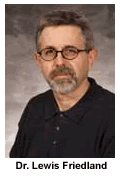►Dr. Lewis A. Friedland is a professor in the School of Journalism & Mass
 Communication
at the University of Wisconsin-Madison, and an affiliated professor in the Department of Sociology. Friedland Communication
at the University of Wisconsin-Madison, and an affiliated professor in the Department of Sociology. Friedland
 earned a B.A. in sociology from Washington University in St. Louis and a Ph.D. in sociology from Brandeis University in 1985. Friedland joined UW-Madison in 1991, was promoted to associate professor in 1997, and professor in 2002. He founded and directs the Center for Communication and Democracy. earned a B.A. in sociology from Washington University in St. Louis and a Ph.D. in sociology from Brandeis University in 1985. Friedland joined UW-Madison in 1991, was promoted to associate professor in 1997, and professor in 2002. He founded and directs the Center for Communication and Democracy.
Friedland teaches courses in journalism, communication and society, communication research methods, and civil society and public life. He teaches or has taught J401: In-Depth Reporting,; J561: Mass Communication and Society; J805: Communication Research Methods; J806: Conceptualization and Design of Mass Communication Research; J870: Mass Communication and Societal Institutions; J970 Mass Communication and Societal Institutions; J980: Special Topics in Mass Communication (Communication and the Public Sphere, joint with sociology).
His publications include three books: Public Journalism: Past and Future (Kettering Foundation Press: 2003); Civic Innovation in America: Community Empowerment, Public Policy and the Movement for Civic Renewal, with Carmen Sirianni (University of California Press: 2001); and Covering the World: International Television News Services (Twentieth Century Fund Press: 1993). With Sirianni, he is currently writing The Youth of Our Democracy, on youth and civic engagement in the U.S. His recent book chapters have included the topics of qualitative research methods in mass communication, public journalism, American community, and theory of community structure and communication. He has published articles and monographs on topics including the structure of international television news, coverage of Tiananmen Square, the changing structure of public television, new media technologies and electronic democracy, community and communication, and civic and public journalism.
Friedland’s research has been supported by major foundations, including the Ford Foundation, the Pew Charitable Trusts, the Knight Foundation, the Kettering Foundation, the Center for Information on Civic Learning and Engagement (CIRCLE), and others. His current research is in three major areas: youth civic engagement and the lifeworld of young people; community media ecologies and civic and public life; and the theory of communicative action.
First, he is conducting a multi-year ethnographic investigation of youth and civic engagement in Madison, interviewing and observing youth in area high schools, youth programs, associations and informal cultural settings. The goal is to inductively develop a range of types of youth civic engagement, placed in the context of youth life-worlds, including the consumption of youth culture, media, and new technologies.
Second, he is researching community media ecologies, including new technologies for collaborative civic mapping and reporting. This is both theoretical and practical research. In modeling the interaction of community and media environment, Friedland hopes to demonstrate the close relationship between media consumption in the local community and the development of civic and democratic capacities, both at the community level and more generally. This model is being developed as an experimental “community information commons,” a civic and public media portal on the web that will provide a space for experiments in new forms of democratic media, as well as research data, and opportunities to practice new forms of democratic journalism for graduate and undergraduate students. Further, new processes and software for mapping community networks, the core of local social capital, are being tested and deployed in Madison.
Finally, he is conducting research on the relation between Jürgen Habermas’s theory of communicative action and contemporary problems in communication theory and research. The theory of communicative action is the most comprehensive account of the foundation of communication in complex, post-industrial societies, yet its difficulty has kept it from being absorbed by researchers in the fields of communication. To bridge this gap, Friedland is working on a series of articles, leading to a book on the theory of communicative action, and editing a volume on the subject.
Friedland has been an active experimenter in the use of new communication technologies and the public sphere. In 1993, he was the principal investigator and publisher of ONline Wisconsin, one of the first multimedia journals on the Internet. As research director and editor of the Civic Practices Network, with Carmen Sirianni, he developed one of the first civic portals on the Internet in 1994. He is a consultant to Wisconsin Public Television for news and public affairs. His documentary productions have won du Pont-Columbia, Emmy, Society for Professional Journalists and Corporation for Public Broadcasting Gold awards. Before joining the UW-Madison faculty, Friedland was executive producer at the CBS affiliate in Milwaukee, and a news and documentary producer at the NBC affiliate in Salt Lake City, and he was a visiting graduate lecturer in sociology at the University of California-Berkeley.
Next page |